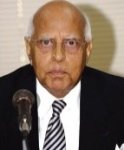Bangladesh Elections 2013
Can the President Resolve the Political Crisis?
03 Dec, 2013 · 4208
Harun ur Rashid suggests that as the guardian of the constitution, the president may intervene to give expression to the will of the people
BNP Chairperson Khaleda Zia on 19 November 2013 met President Abdul Hamid and urged him to take steps towards a consensus between the ruling and the opposition parties for holding a free, fair and participatory election under a non-party government. Six eminent citizens led by Dr Kamal Hossain also met the President on 26 November to resolve the national crisis within his limited constitutional powers. It is reported that the President said his constitutional powers were limited with regard to taking any such initiative. He assured that he would do his best within his powers for resolving the ongoing political crisis.
President Hamid was also quoted by his Press Secretary as telling the opposition leader Begum Zia, “No government has incorporated any provision in the constitution that allows the president to take steps to overcome a critical situation.” This remark of the President is significant because the President’s powers were taken away by the 12th Constitutional Amendment in 1991 when Begum Zia was the Prime Minister. Thereafter, the successive governments including Awami League governments failed to restore the powers of the President, and there exists an imbalance of powers between the President and the Prime Minister.
The announcement of the poll schedule on 25 November sharply divided the country. Since then, BNP and its allies have continued to call a blockade programme, leading to arson, blasts and deaths of many people all over the country. In October-November alone, 36 people died. One of the effects of the political crisis is the creation of fertile ground for the ugly heads of Islamic extremism to rise in a country that may be of security concern to the region.
Given the context, the Ambassadors of the US, Canada, Australia, Germany and European Union, and the UN, expressed concern and urged the political leaders of both sides to arrive at a settlement. Even the Chinese and Japanese envoys who normally keep quiet on internal matters expressed concern over the situation.
The Indian envoy has been active in discussing the issue with the US envoy, and the Prime Minister's son reportedly met him on 11 November. One Indian High Commission official was reported to have met the Chief Election Commissioner on 12 November. India’s Foreign Secretary is scheduled to visit Dhaka on 4December and the UN envoy arrives on 6 December.
Despite the limitations of the constitution, it is argued the President cannot be a silent spectator to a national crisis. The President is the head of state and the Prime Minister is the head of government - one of its three organs of the state, the other two being the parliament and the judiciary.
The President of Bangladesh, when elected by the parliament, resigns from the political party he/she is affliated with and becomes non-partisan. He/she is the head of state, and symbolises the wishes and aspirations of the people of Bangladesh. He/she is the guardian of the constitution; not only its letters but also its spirit. As a guardian, he/she has to ensure that people’s wishes are translated into action.
Article 7(1) of the constitution stipulates that all powers in the Republic belong to the people. If a large section of people affiliated to a major political party boycotts the parliamentary election, it could be argued that such election will not reflect the powers of all the people and hence is contrary to provision of the constitution.
This being so, it may be argued that the President, the guardian of the constitution, which, under 7(2), is the “solemn expression of the will of the people”, may intervene to give expression to the will of the people by inviting all the political leaders to resolve the crisis.
Furthermore, the President may not only request the Prime Minister under Article 48(5) to refer the matter raised by the BNP chairperson for the consideration of the cabinet, but may also seek an Advisory Opinion under Article 106 from the Appellate Division of the Supreme Court on what the President can do under the constitution to resolve a national crisis.
If the violent political confrontation continues, the lives of the people of the country will be at grave risk. Bangladesh has earned the good reputation of keeping peace by sending its personnel to conflict-zones around the world under the UN, and it will be ironic if peace does not exist in Bangladesh itself.
Furthermore, the economy will be ruined. The people suffer because the politicians fight among themselves over power. It is like when two elephants fight, it is the grass that gets trampled.
Many suggest that the President, from his exalted position, can exercise his authority as guardian of the constitution to ask the leaders of the both ruling AL and opposition BNP to start a dialogue at the Secretary-General level to resolve the political impasse. The people are looking up to him to find a way out of this national crisis.


